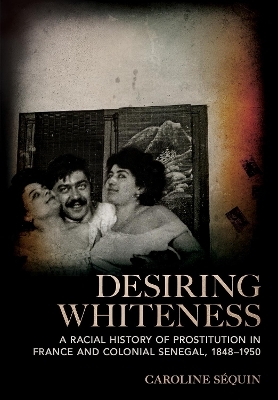
Desiring Whiteness
A Racial History of Prostitution in France and Colonial Senegal, 1848–1950
Seiten
2024
Cornell University Press (Verlag)
978-1-5017-7703-5 (ISBN)
Cornell University Press (Verlag)
978-1-5017-7703-5 (ISBN)
Desiring Whiteness uncovers the intertwined histories of commercial sex and racial politics in France and the French Empire. Since the French Revolution of 1789, the absence of laws banning interracial marriages has served to reinforce two myths about modern France—first, that it is a sexual democracy and second, it is a color-blind nation where all French citizens can freely marry whomever they wish regardless of their race. Caroline Séquin challenges the narrative of French exceptionalism by revealing the role of prostitution regulation in policing intimate relationships across racial and colonial boundaries in the century following the abolition of slavery.
Desiring Whiteness traces the rise and fall of the "French model" of prostitution policing in the "contact zones" of port cities and garrison towns across France and in Dakar, Senegal, the main maritime entry point of French West Africa. Séquin describes how the regulation of prostitution covertly policed racial relations and contributed to the making of white French identity in an imperial nation-state that claimed to be race-blind. She also examines how sex industry workers exploited, reinforced, or transgressed the racial boundaries of colonial rule.
Brothels served as "gatekeepers of whiteness" in two arenas. In colonial Senegal, white-only brothels helped deter French colonists from entering unions with African women and producing mixed-race children, thus consolidating white minority rule. In the metropole, brothels condoned interracial sex with white sex workers while dissuading colonial men from forming long-term attachments with white French women. Ultimately, brothels followed a similar racial logic that contributed to upholding white supremacy.
Desiring Whiteness traces the rise and fall of the "French model" of prostitution policing in the "contact zones" of port cities and garrison towns across France and in Dakar, Senegal, the main maritime entry point of French West Africa. Séquin describes how the regulation of prostitution covertly policed racial relations and contributed to the making of white French identity in an imperial nation-state that claimed to be race-blind. She also examines how sex industry workers exploited, reinforced, or transgressed the racial boundaries of colonial rule.
Brothels served as "gatekeepers of whiteness" in two arenas. In colonial Senegal, white-only brothels helped deter French colonists from entering unions with African women and producing mixed-race children, thus consolidating white minority rule. In the metropole, brothels condoned interracial sex with white sex workers while dissuading colonial men from forming long-term attachments with white French women. Ultimately, brothels followed a similar racial logic that contributed to upholding white supremacy.
Caroline Séquin is Assistant Professor of Modern European History at Lafayette College. She received her PhD in History from the University of Chicago.
Introduction
Abolishing Slavery, Instituting Prostitution
From Mariages à la Mode du Pays to Commercial Sex
The Road to Dakar
"Colonisation the Wrong Way Round"
Subversive Desires
Breaking the Marthe Richard Law
Extending the Marthe Richard Law to the French Union
Epilogue
| Erscheinungsdatum | 06.09.2024 |
|---|---|
| Zusatzinfo | 1 Maps; 6 Halftones, black and white |
| Verlagsort | Ithaca |
| Sprache | englisch |
| Maße | 152 x 229 mm |
| Gewicht | 907 g |
| Themenwelt | Geisteswissenschaften ► Geschichte ► Regional- / Ländergeschichte |
| Geisteswissenschaften ► Psychologie ► Sexualität / Partnerschaft | |
| Sozialwissenschaften ► Ethnologie | |
| Sozialwissenschaften ► Soziologie | |
| ISBN-10 | 1-5017-7703-3 / 1501777033 |
| ISBN-13 | 978-1-5017-7703-5 / 9781501777035 |
| Zustand | Neuware |
| Haben Sie eine Frage zum Produkt? |
Mehr entdecken
aus dem Bereich
aus dem Bereich
Erinnerungen
Buch | Softcover (2024)
Pantheon (Verlag)
16,00 €


